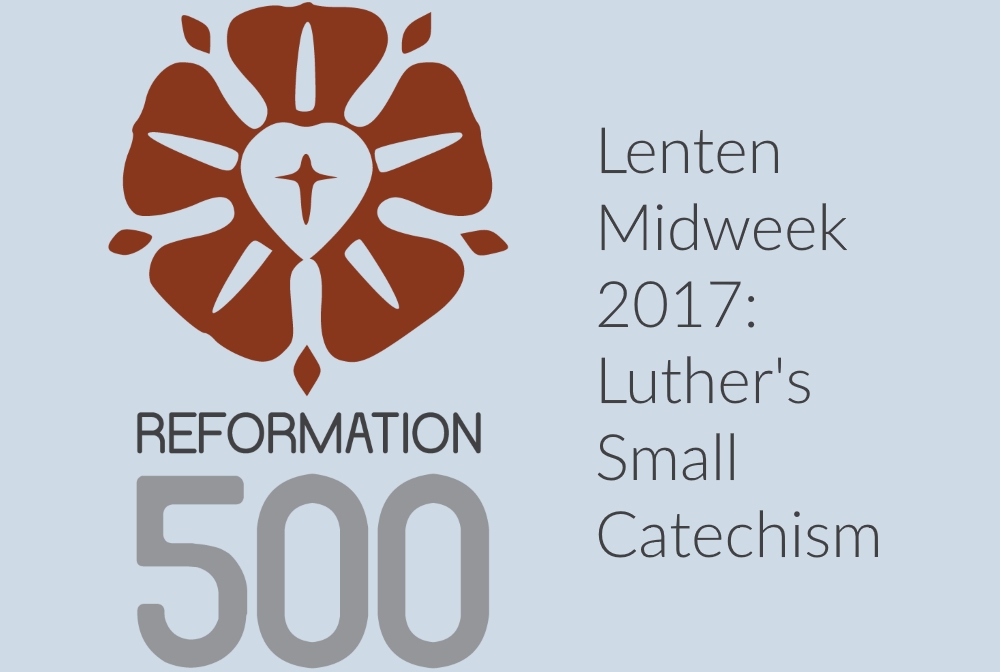The Sacrament of the Altar
Preacher: Pastor Braun Campbell Series: Lenten Midweek 2017: Luther's Small Catechism Category: Biblical Scripture: Matthew 26:26–29
Lenten Midweek 5
St. John's Lutheran Church, Alexandria, VA
Luther’s Small Catechism: The Sacrament of the Altar
Depending on where you’re at, you might do it every week. You go up to receive the Sacrament of the Altar (also named Holy Communion, the Lord’s Supper, and the Eucharist, among others). You gather with other Christians around the Lord’s Table, and then hear the simple instructions, “Take and eat.” “Take and drink.” You eat and drink, or maybe simply come forward to receive a blessing. You go back to your seat, and then out into the world. But what’s really happening when you go to the Lord’s Table?
Luther had a lot to say about Holy Communion. While in the Small Catechism he sought to teach about it in a “simple way,” Luther’s other writings – including the Large Catechism – point to the great importance of the sacrament for a Christian’s life. Look at where the altar is in most Lutheran sanctuaries, right there at the center of our life together, lifted up between the baptismal font and the pulpit, drawing our community together around the table where God offers us divine food and drink. This meal is a testament of God’s sacrificial love. Look to Luther’s description of the Sacrament of the Altar in the Small Catechism, and you’ll see him highlighting this main point about the Lord’s Supper: it is God giving Himself to you, for you.
When you come to the Eucharist, you are eating Jesus’ body and drinking Jesus’ blood. That’s not a metaphor. It’s not a mere symbol by which we remember Christ. It is Christ here for you. That’s what we mean when we talk about the “real presence.” We take Jesus at his word. At the Last Supper, Jesus instituted a gift for his disciples, his Church, speaking the word of promise that the bread is his body, given for you, and that the wine is his blood, shed for you, for the forgiveness of sin. We don’t attempt to explain the “how” of it, because God doesn’t explain it. We simply believe that the God who created everything from nothing by His Word can be physically present in, with, and under the bread and the wine when He says that it is so. Why does Jesus’ real presence in the sacrament matter? Imagine that there’s a fire in your house. Would you want a fire extinguisher – or a picture of a fire extinguisher? Sure, the picture serves to remind you of a fire extinguisher, but it can’t do what the actual thing can do!
So what is God giving to you if He’s actually giving you Himself? Like Baptism, Holy Communion is a sacrament, one of those tools that God uses to deliver His gifts of grace. He joins His word of promise to ordinary physical elements, taking hold of them to do the extraordinary.
Using created things, God reaches down to bring His people up. Gathered together around the altar, you and I are guests at the greatest banquet of all time: God connects us in community with the people around us and with all the Church throughout time and space, including all those who have gone before us in the faith. You are made to be a part of something infinitely greater than yourself. That’s one of the reasons that we share a common cup, a reminder that faith and life aren’t merely an individual experience. You are sharing a divine meal with all the redeemed in Christ. Baptism made you a part of God’s family in Christ, and this is the ultimate family feast!
The Lord’s Supper isn’t all about eating and drinking, however. We come to the feast in faith, trusting in God’s Word of promise that we will receive what He says He’ll give. God even gives us the faith that we need to trust His promise in the first place. Just as God worked through Baptism to make you His own child and give you faith, He strengthens your faith through Holy Communion. When you receive God’s gift at the altar in faith, you’re getting forgiveness for your sin. You’re receiving an infusion of renewed life, restored life at peace with God and with the people around you. That’s shalom.
Come to the altar to receive God’s gifts, and do it often! Think about it this way: the Sacrament of the Altar is powerful, divine medicine. It benefits it body and the soul, alike. It is an antidote to the poison of sin, poison that drains your life away day by day. The medicine that restores a dying man to health doesn’t become any less important if he should take it each week, or even each day. Similarly, the Lord’s Supper shouldn’t be taken lightly, without reflecting on what’s going. Medicine can be harmful to those who would abuse it, or who shouldn’t be taking it. That’s why we’re called to approach the table with hearts that are both repentant and joyful.
What’s really happening when you go to the Lord’s Table? God’s giving you free gifts. Come in faith, trusting His promise – and receive!
Amen.
other sermons in this series
Mar 29
2017
The Sacrament of Holy Baptism
Preacher: Pastor Braun Campbell Scripture: Romans 6:1–14 Series: Lenten Midweek 2017: Luther's Small Catechism
Mar 22
2017
The Lord's Prayer
Preacher: Rev. Jack Meehan Scripture: Matthew 6:5–15 Series: Lenten Midweek 2017: Luther's Small Catechism
Mar 15
2017
The Apostles' Creed
Preacher: Pastor Braun Campbell Scripture: John 14:15–17, John 14:25–27 Series: Lenten Midweek 2017: Luther's Small Catechism
